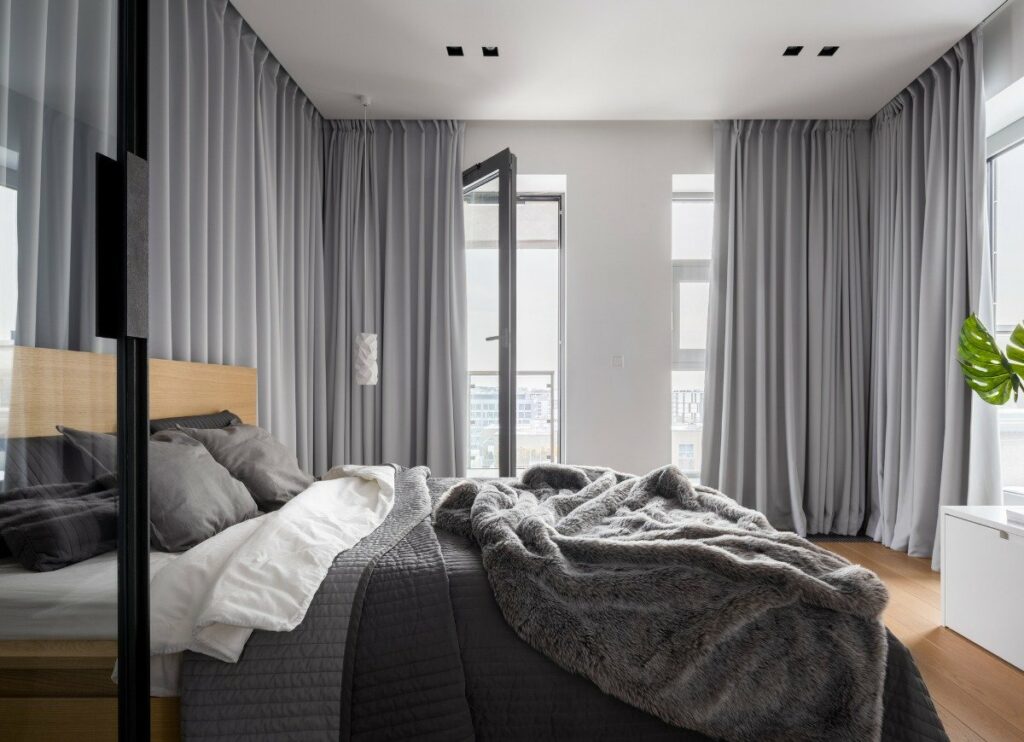It goes without saying that silence is essential for a good night’s sleep. Whether it’s the sound of your snoring partner or traffic blares at 4 a.m., resting soundly doesn’t come easy for light sleepers. Interruptions in the middle of the night can be detrimental to your health as your sleep cycles keep getting restarted, preventing your body from properly restoring.
Studies find that those who sleep in a quiet environment get better sleep and wake up feeling more refreshed than those who don’t. High noise levels lead to restlessness, insomnia, and even increased risks for cardiovascular problems. Whether you’re a light sleeper or just cursed with a noisy neighborhood, there are ways to keep the noise level at a minimum.
Add some rugs.
If your floors are wooden, try covering them with thick carpets or rugs. You can lay them over sound-absorbing foam to further reduce any noise. The more variation in texture, the quieter your room will be. Hanging them on your walls will also absorb sound coming from the other side. If you prefer a solid surface, consider cork flooring over wood for your room.
Invest in a bookshelf (and stock it up).
Mounting bookshelves to your wall will not only showcase your scholarly aptitude but also act as a barrier against sound. It makes your walls thicker, hence the sound-proofing. Make sure it’s filled though; empty bookcases will only funnel sound waves into your room.
Soundproof your bedroom door.
If you live in an apartment with noisy neighbors, shutting the noise outside your door may due the trick. Try hanging a curtain or tapestry over your door to absorb any sound. If noise is still pouring in from the cracks, install a door sweep to block the gap. You can also opt for a rolled up blanket or towel to place at the bottom of the door.
Place acoustic panels on your walls.
Acoustic panels are a great way to add color and shape to your room. They come in a variety of fabrics and shades, and you can even use them as artwork by customizing them with photos. Just spread them out evenly among all your walls to get proper sound absorption.
For a more affordable option, you can just cover your walls with any soft material to reduce reflected noise. This includes tapestries, carpets, or any fabric you have to hang.
Hang up soundproof curtains.
The sound of traffic jams and construction is far from dreamy. Swap out your regular curtains or blinds with soundproof curtains. These will create a barrier between your room and the window, keeping the sound from echoing.
If you like the view from outside or rely on the sunlight to wake you up, try window inserts instead. They are airtight window frames that prevent sound from entering. Some are easily removable, allowing you to open your window with ease. This way, you’ll get natural light without any ruckus.
Rearrange your furniture.
Sometimes reducing noise is as easy as moving some furniture around. Repositioning your bed just a few feet from your wall can make all the difference. Especially if the sound is coming from your next door neighbors, try placing your bed farthest from the wall as possible. Arranging pillows on your bed will also help muffle any sound.
Play background music.
If you just need something to neutralize the sound, try playing background music. This will dampen the noise from outside and create a more peaceful environment. Consider purchasing a white noise machine, which plays a constant background sound that drowns out other noises. For those who struggle with falling asleep in general, you can choose to play nature sounds, machinery noises, or ambient soundscapes to bring serenity to your space.
There are many apps available, such as myNoise and Noisli, that act as white noise machines. Turning on your fan during the night can also create white noise while also making your room feel cooler.
Wear comfortable headphones.
For those with snoring partners or roommates, try noise-cancelling headphones. There are many comfortable pairs available to try out.
If headphones still seem too bulky, consider sound-reducing headbands or earmuffs. Not only do they block out sound, but some also play white noise to help you relax. If all else fails, you can always just use foam earplugs to reduce any sound.
Good night!
Getting enough sleep is very important for your body and mental state. This means sleeping uninterrupted and going through all the sleep cycles. While some noise is unavoidable, limiting the small bumps and clanks in your room can help you feel more energetic and ready to face the day.
